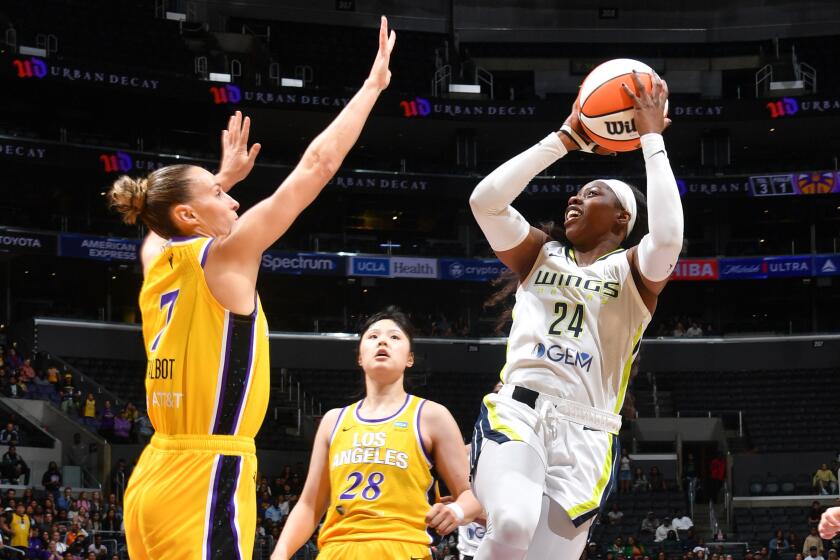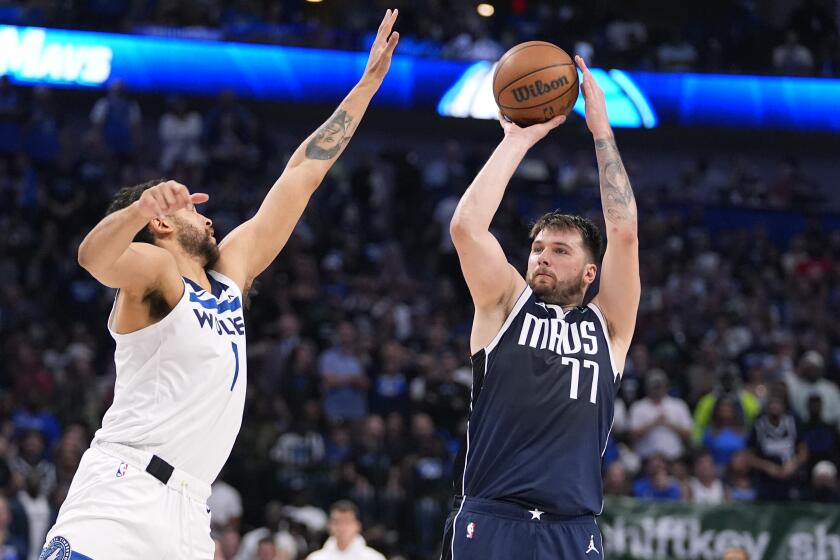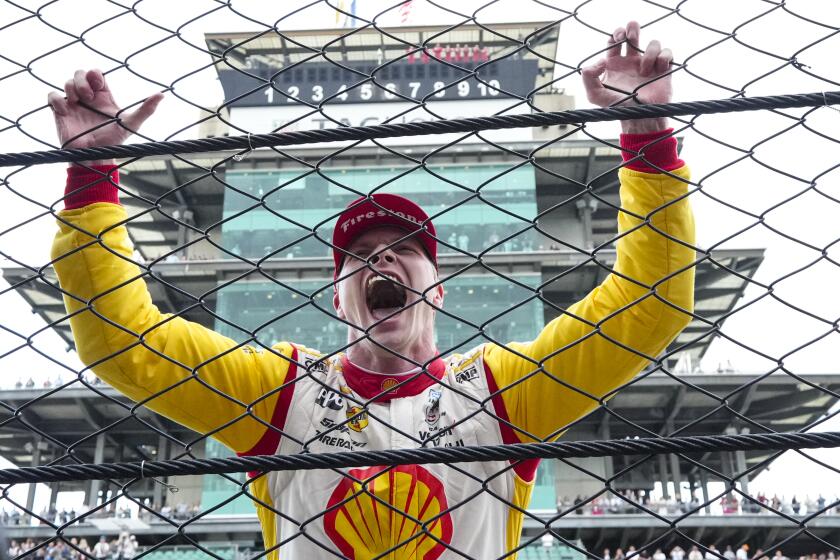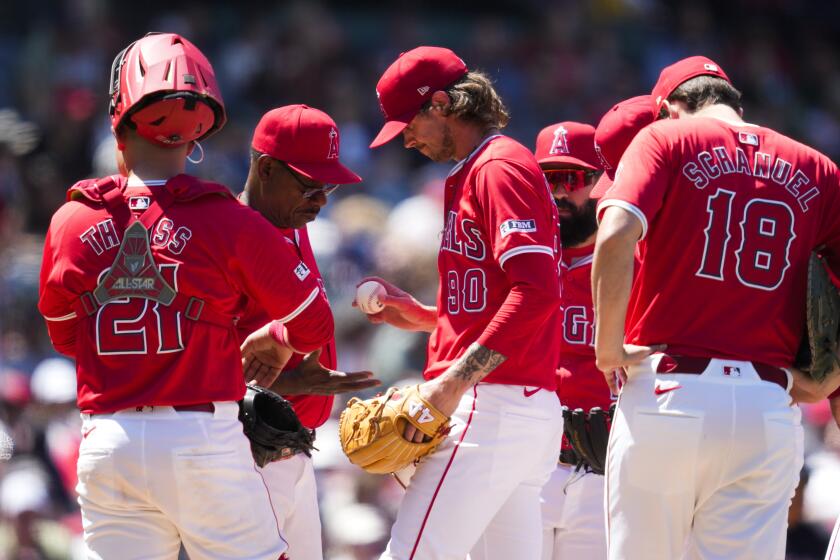The NFL Draft Dilemma: Play Now or Play the Odds
Sitting in the front row, his football pants still grass-streaked from practice, Reggie Bush raised his hand. He had a question about dealing with agents.
The two former National Football League executives standing at the front of the room Tuesday did not mince words. They told the USC tailback and his teammates about agents’ commissions -- “Don’t pay 3%. Tell them 1%” -- and about dealing with taxes and front offices.
“You guys are your own little business,” said Joe Mendes, a former Washington Redskin vice president. “You have to figure out the best way to optimize your value.”
With an undefeated team headed for the national championship game Jan. 4 at the Rose Bowl, the Trojans’ roster includes a handful of juniors and sophomores talented enough and eligible, under NFL rules, to turn professional after the season. So their coach, Pete Carroll, asked two longtime friends of his, Mendes and former New York Jet executive Pat Kirwan, to give a seminar on the pros and cons of leaving school early.
Bush, the Heisman Trophy winner, is expected to enter the draft and is considered a top pick. The situation is not so clear-cut for teammates such as tailback LenDale White, offensive lineman Winston Justice and safety Darnell Bing, who said, “Agents try to get at you. There are a lot of people telling you what to do.”
Every year at this time, college football’s best underclassmen face a tantalizing gamble: Should they go for the money now or wait a year in hopes of making more?
If they turn pro and are chosen in the top eight spots, they can receive in excess of $13 million, guaranteed. But the figures steadily drop from there. This is where young athletes meet the business side of their game.
Last spring’s top draft pick, quarterback Alex Smith, commanded a $49.5-million contract that guaranteed him $24 million, even if he proved a complete bust. By the 10th pick, former USC receiver Mike Williams, received $10.5 million guaranteed. The last selection of the round, guard Logan Mankins, signed for $4 million guaranteed.
By the second round, the average guarantee fell to $1.4 million, Kirwan said. By the third, it was $526,000.
Predicting exactly where a player might be drafted is guesswork, especially for underclassmen. They must submit their names for the draft in January -- before they have a chance to perform for scouts in private workouts or at the NFL combine, a group showcase in Indianapolis.
Much of what happens on draft day in April is predicated on these sessions.
“When they go to Indy and blow you away, they go up,” said Gil Brandt, a former Dallas Cowboy executive. “And, to be quite honest, if they don’t do well, they’re going to drop.”
Even if a player aces the combine, an important question remains: Which teams need someone at his position, and where will they pick in the draft?
Last spring, California quarterback Aaron Rodgers left school early and was touted as a potential No. 1 pick. But when the San Francisco 49ers chose Smith of Utah instead, no team picked a quarterback until Green Bay took Rodgers with the 24th selection.
“That’s a huge difference,” Brandt said. “I mean, millions of dollars.”
Complicating a player’s decision to enter the draft, and thereby forfeit his college eligibility, is what longtime agent Leigh Steinberg calls a “cacophony of conflicting advice.”
Agents might whisper about high draft positions and large bonuses, hoping to sign the player as a client. College coaches, wanting to keep him around, might low-ball his prospects. Family and friends will have ideas of their own.
“Virtually everyone in their life has something to gain from the decision,” said Paul Haagen, a Duke law professor who counsels high-profile college athletes. “It’s very hard to establish trust.”
Lofa Tatupu heard no shortage of opinions when he was considering an early departure from USC last spring.
Teammates supported the linebacker, but nearly everyone else advised him to wait, saying that he would go in the fourth or fifth round, that he could play his way up to a more lucrative spot with another year of college. Carroll, who has been forceful about players staying in school, echoed this message.
“He was just being real with me,” Tatupu said. “He told me what he had heard. He told me, as a man, how he felt personally.”
Tatupu might have sought further counsel from the NFL -- players can ask a panel of pro scouts for an educated guess on where they might be drafted -- but he missed the deadline to submit his applications, and “I went into it blind,” he said.
The NFL makes no secret of its position on the matter. The league sends a pamphlet to underclassmen considering the draft titled “Stay in School.”
“It’s a sensitive topic,” said Floyd Reese, general manager of the Tennessee Titans. “If you talk to most pro personnel people, they would rather have the players stay in to get the extra year of maturity.”
Even agent Steinberg said, “Virtually any player will benefit from another year in school.”
Personnel directors want to see athletes get bigger and more experienced. They want an extra year to scout before making that million-dollar draft choice.
Still, for players wanting to leave early, the NFL’s College Advisory Committee -- composed of two scouting experts and personnel executives from 12 teams -- will provide an estimate of where they might be selected.
The number of underclassmen seeking this information has grown from 53 in 1994 to 101 last year, the league says. Of the 759 players who have been evaluated, 63% chose to stay in school.
Because the NFL collective bargaining agreement has shifted dollars from rookies to veteran players, “only those draft choices at the very top now have an incentive to leave school,” the league states.
But for some talented juniors, “it’s really scary to stay,” said Haagen, the law professor.
Injury is a big concern. Running backs are especially vulnerable, and no one has forgotten that Miami star Willis McGahee tore knee ligaments in the 2003 Fiesta Bowl, minutes before the end of his college career.
Tatupu ultimately decided to turn pro to help his family. He realizes this decision might have cost him millions.
Selected in the second round, higher than predicted, he received less than $2 million guaranteed. Some NFL experts believe that had he played his senior season, he would have been a first-round selection and earned twice as much.
Tatupu might squeeze another NFL year into his shelf life as a player, which could mean an extra contract renegotiation down the line. But, as Brandt points out, underclassmen drafted down the board probably won’t recoup the guaranteed money they might have lost by coming out early.
Tatupu, a rookie star for the Seattle Seahawks, has no regrets. “I had accomplished everything I wanted to in college,” he said. “Here, you’re playing against the best. It’s fun.”
The same cannot be said for Williams, who tried to join the NFL as a sophomore but saw the courts uphold a league rule that players must wait until three years after high school. After sitting out a year, he is now a rookie with the Detroit Lions.
Williams recently told The Times that he reminisces about his days hanging around with his college teammates. “I miss that,” he said.
On the flip side of this regret stands Matt Leinart. Last winter, after winning the Heisman Trophy and guiding his team to a national title, the quarterback chose to stay for his senior season. His decision was widely criticized in the media and, more quietly, among some in the game. After all, he was a probable top-five pick -- if not No. 1 -- with nowhere to go but down.
But Leinart was nervous about entering the draft with an elbow and groin injury that have now healed. He also insists that he wanted to have fun -- a few more of those days that Williams misses -- before leaving school.
Brandt praised his choice, saying that no matter what happens with the NFL’s collective bargaining agreement, guaranteed money continually rises for top draft picks. Tennessee’s Reese went back to the issue of maturity and experience.
“Just the Notre Dame game alone,” he said, referring to USC’s last-second 34-31 victory, “is worth staying an extra year.”
More to Read
Get our high school sports newsletter
Prep Rally is devoted to the SoCal high school sports experience, bringing you scores, stories and a behind-the-scenes look at what makes prep sports so popular.
You may occasionally receive promotional content from the Los Angeles Times.







